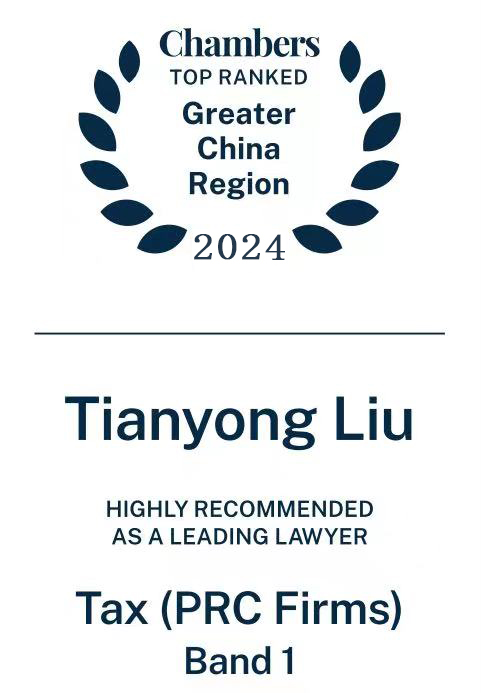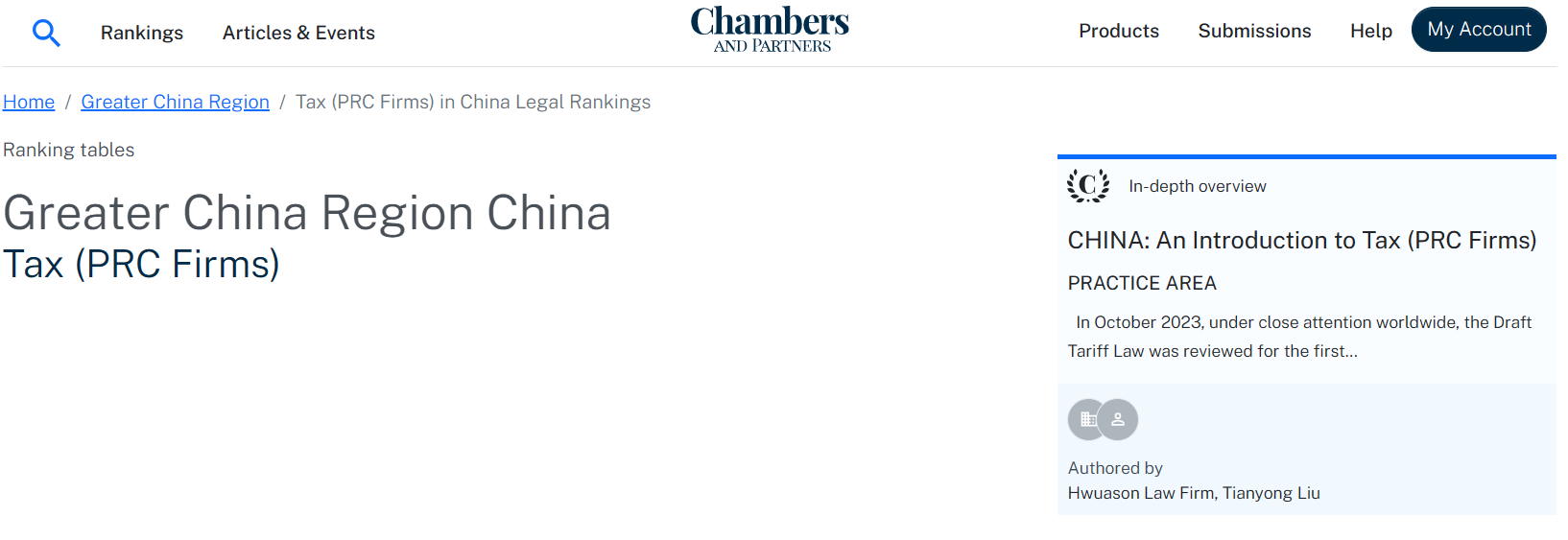Hwuason lawyer Liu Tianyong was accepted Chambers' exclusive invitation to write the article "Greater China Region Guide 2024 - China's Tax Law Reforms 2024"
On January 18, 2024, Chambers and Partners, the world's leading legal media, released the “Greater China Region Guide 2024”,Mr. Liu Tianyong, the director of Hwuason Law Firm, was honored to be listed as one of the Band 1 in China's tax law. Mr. Liu Tianyong has been listed in the Chambers Asia Pacific Legal Guide and Greater China Region Guide as one of the top lawyers in China's tax law for more than ten consecutive years since 2010.

This year, Mr. Liu Tianyong once again accepted Chambers' exclusive invitation to write the article "Greater China Region Guide 2024 - China's Tax Law Reforms 2024" for inclusion in Greater China Region Guide 2024. The article are reproduced below:

China's Tax Law Reforms 2024
Release of Draft Tariff Law
In October 2023, under close attention worldwide, the Draft Tariff Law was reviewed for the first time by the NPC Standing Committee, and was released on December 29th to the public for opinions. The Draft is based on promoting high-level opening-up, balances both sovereign right safeguarding and foreign trade promotion, strengthens the priority position of preferential tax rates in signed international treaty agreements, and adds the reciprocity principle provision to counter trade protectionism and unilateralism. Equally notable is that the Draft has made a series of significant adjustments and changes to PRC Regulations on Import and Export Duties.
Compared with the current PRC Regulations on Import and Export Duties, the most obvious reform of the Draft is the collection and management procedures and related rules. The Draft abandons the rule that customs pre-examine the tax amount, and establishes a new procedure: taxpayers shall first declare and pay taxes independently; afterwards, customs only confirm or adjust taxes. After declaration, customs will no longer issue tax payment bills; taxpayers shall pay within 15 days from the tax declaration completion date, no longer from the tax payment bill issue date. Moreover, the Draft allows taxpayers to apply for a maximum extension of six months for tax payment after providing a tax guarantee.
In order to strengthen customs' ex post supervision, the Draft adds rules of administrative compulsory measures and enforcements: preventing outstanding taxes departure; anti-tax avoidance; legal liabilities of taxpayers for various illegal actions; and extending the scheduled period of tax collection. If the consequence of not paying or paying less tax has not been caused by the taxpayer' s fault, customs are authorised to collect tax within three years, instead of one year. If the consequence is caused by the taxpayer's illegal actions, customs are authorised to collect tax without time limitation, instead of within three years. The Draft equally emphasises the protection of taxpayers' rights. For example, full tax payment, the condition before applying for administrative reconsideration, is no longer required. Taxpayers also have the right to apply for a refund of overpaid tax within three years, instead of one year, and interest at the bank deposit rate for the same period will additionally be refunded.
According to China legislation rules, the Draft Tariff Law will go through the subsequent review process in 2024, and will be adopted before 2027. Legislative progress is now speeding up, and it will cause significant impact to China's foreign trade and the world economy.
Progress of Other Tax Legislation
Up until now, 12 of China’s current 18 tax categories have enacted laws. In 2024, the legislative progress differs for value-added tax, consumption tax, land value-added tax, land use tax and house tax.
The Draft Value-Added Tax Law may be adopted in 2024. In August 2023, the Draft Value-Added Tax Law was reviewed, secondly, by the NPC Standing Committee. Value-added tax accounts for a significant proportion of national tax revenue and the legislation impacts on widespread industries, so the Draft attracts close attention in all circles. At present, the legislature has collected relatively sufficient numbers of opinions from the public, and the Draft for Second Deliberation is relatively mature and complete, so hopefully the Draft may be adopted in 2024.
It remains to be seen whether the Draft Consumption Tax Law will be submitted for initial review in 2024. In 2021, the State Council planned to submit the Draft for initial review, but it was not finally submitted. Subsequently, the Draft was not included as a “ready to submit” project in the 2022 and 2023 legislative work plans, but was listed only as a project “preparing to submit”. In recent years, the legislative progress of consumption tax has been relatively slow, mainly due to the following three reasons. First, the distribution of consumption tax sources between the central and the local needs further optimisation. Second, the Draft shows complex collection processes, causing numerous controversies. Third, the Draft fails to address many issues such as safeguarding taxpayers’ information rights, safeguarding the international competitiveness of enterprises, maintaining macroeconomic flexibility, and so on.
The legislative progress of Real Estate Tax is slowing down. In September 2023, the NPC Standing Committee announced the five-year legislative plan 2023–2027, striving to complete the legislation on value-added tax, tariff and consumption tax before 2027. However, the land value-added tax, land use tax and house tax are not included in the five-year plan. It shows that China real estate tax law legislation will not have any breakthrough progress during the next five years.
Tax Collection and Management Reforms
Tax reduction policies tilt towards investment and financing sectors and high-tech industries in 2024. For some examples, from 1 January 2024 to 31 December 2027, real estate transactions incurred by enterprises due to mergers and acquisitions are exempt from deed tax and land value-added tax. Where the R&D expenses that have actually been incurred by an integrated circuit enterprise or industrial machine tool enterprise when it conducts any R&D activity have not been included in the current profit and loss account as intangible assets, in addition to the deduction of the prescribed expenses, another 120% of the R&D expenses actually incurred shall be deductible before tax payment between 1 January 2023 and 31 December 2027. If the said expenses have been converted into intangible assets, such expenses may be amortised at the rate of 220% of the costs of the intangible assets before tax payment during the said period. Besides, a series of inclusive tax incentives policies will continue in 2024, benefiting a large number of domestic small and medium-sized enterprises.
In 2024, China will deepen the reform of smart taxation. The application of tax-related big data has connected tax information from multiple departments such as taxation, banking, IIT, MR and customs. E-invoicing reform is fully utilised, and the whole process of invoice issuance and use will be verified and monitored in real time, bringing about a transformation from the punishment of tax offences to accurate prevention in advance. The intelligent collection of “one legal person-based” and “one natural person-based” tax and fee information is basically realised by smart taxation. Data-driven tax administration not only brings segmented and precise supervision, but also brings higher requirements of tax compliance for enterprises.
Risks of tax-related criminal liability for enterprises remains severe in 2024. In October 2021, the Supreme Procuratorate, Public Security Ministry, State Taxation Administration, General Customs, State Foreign Exchange Administration and Central Bank jointly launched a system to crack down on tax crimes. In July 2023, the Supreme Court joined this system; thus, seven central departments now jointly crack down on tax-related offences and crimes. From October 2021 to May 2023, nationwide tax and judicial authorities had already inspected and accused 270,000 enterprises suspected of false issuance of invoices and of committing tax refund frauds, identified 10,481,500 false invoices, and saved CNY11.78 billion export tax refund losses. From January to May 2023, some 65,000 enterprises had been inspected and accused, 1,846,200 false invoices had been identified, and CNY4.459 billion export tax refund losses had been saved. This normalised system not only effectively maintains economic tax order and creates a legal and fair business environment, but also makes more enterprises attach importance to tax compliance and actively prevent tax risks.
Tax Compliance Market
Simultaneously, the Supreme Procuratorate and the Supreme Court over the past three years have continued implementing reform of the compliance mechanism for enterprises involved in criminal cases; the enterprise compliance market has commenced and developed in China, and has now become the “most-searched topic” in the legal services market. Tax compliance is an important component of enterprise compliance, and has received particularly prominent attention as a result of strengthened tax law rigidity and deepening tax system reform.
The core of tax compliance is to prevent and respond to tax risks. In recent years, tax risks have exhibited clear characteristics of typification and industrialisation, gathering in certain industries and fields such as energy, pharmaceuticals, renewable resources, bulk commerce, transportation, flexible employment, foreign trade, investment and financing, and high net worth individuals. Tax risk behaviours mainly include false issuance of invoices, tax refund frauds, abuse of tax planning and tax evasion.
In the new year, China enterprises in relevant key tax-risk industries should pay attention to the changing trends of tax risks: not only properly handle historical tax risks, but also prudently face new problems and risks. We strongly recommend that enterprises seek professional support from China tax lawyers to establish internal tax compliance management systems, ensure regular operating activities are compliant with tax law and major business decisions are inspected from a tax law rules perspective. To achieve secure and sustainable growth, tax risks must be prevented early, identified accurately and disposed of legally.





